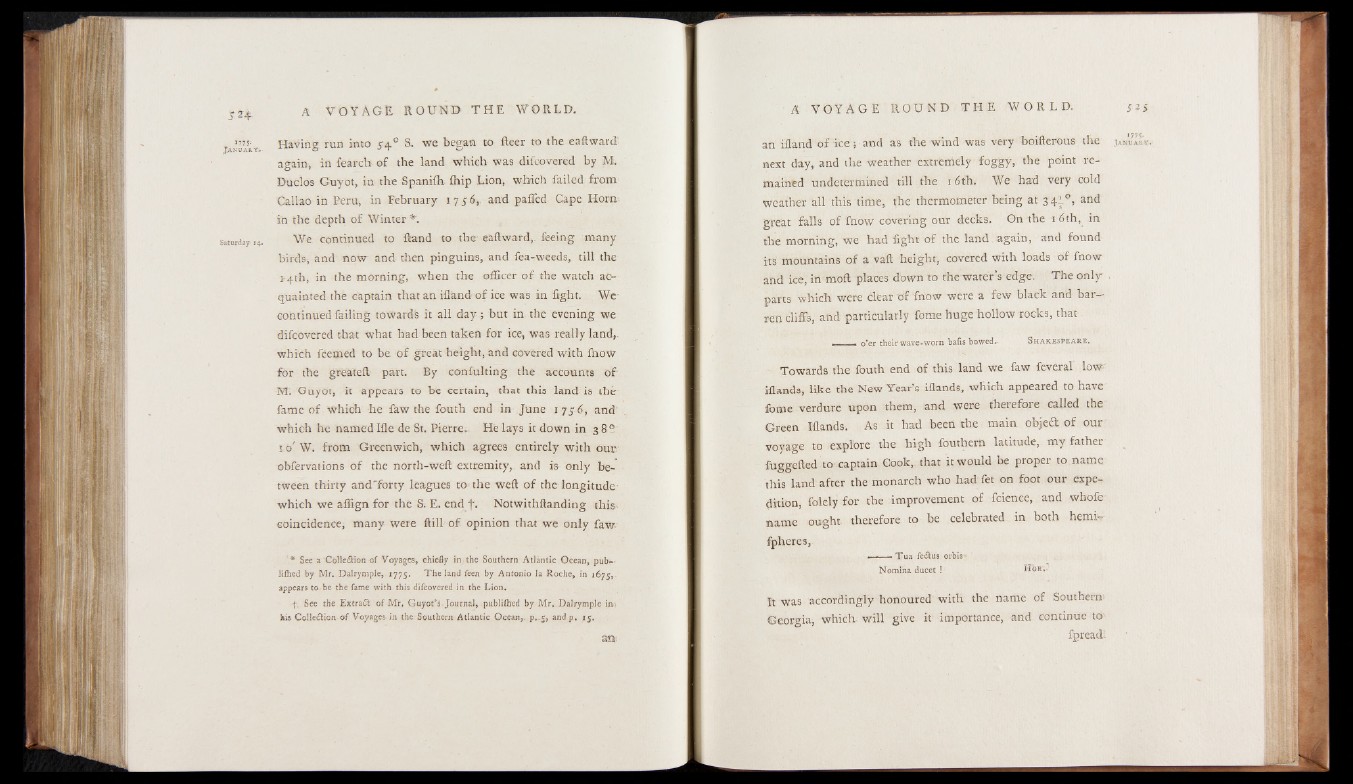
nuS y. Having run into 540 S. we began to fleer to the eaftward
again, in fearch of the land which was difcovered by M.
Duclos Guyot, in the Spaniffi fhip Lion, which failed from
Callao in Peru, in February 1756,. and gaffed Cape Horn
in the depth of Winter *.
Saturday ,4. We continued to ftand to the-eaftward,. feeing many
birds, and now and then pinguins, and fea-weeds, till the
1.4th, in the morning, when the officer of the watch acquainted
the captain that an ifland of ice was in fight. We
continued failing towards it all day ; but in the evening we
difcovered that what had been taken for ice, was really land,,
which feemed to be of great height, and covered with fnow
for the greateft part. By confulting the accounts of-
M. Guyot, it appears to be certain, that this land is the
fame of which -he faw the fouth end in June i 7 5 6, and'
which he named Ifle de St. Pierre. He lays it down in 382
10 W. from Greenwich, which agrees entirely with our,
obfervations of the north-weft extremity, and is only between
thirty and'forty leagues to the weft of the longitude
which we affign for the S. E. end f . Notwithftanding this
coincidence, many were ftill of opinion that we only faw-
* See a Colle&ion of Voyages, chiefly in the Southern Atlantic Ocean, pub--
liflied by Mr..Dalryniple, 1775. The land feen by Antonio la Roche, in 1675,.
appears to-be the fame with this difcovered in the Lion.
f. See the Extradfc of Mr. Guyot’s Journal, publiflled by Mr.DalrympIe im
his Collection of Voyages, in the Southern Atlantic Ocean,, p. 5, and p, 15.
an:
an ifland of ice ; and as the wind was very boifterous the January.
next day, and the weather extremely foggy, the point remained
undetermined till the 1 6th. We had very cold
weather all this time, the thermometer being at 34L9, and
great falls of fnow covering our decks. On the 16 th, in
the morning, we had fight of the land again, and found
its mountains of a vaft height, covered with loads of fnow
and ice, in moft places down to the water’s edge. The only ,
parts which, were clear of fnow were a few black and barren
cliffs, and particularly fome huge hollow rocks, that
, a o’er their wave-worn balls bowed.- Shakespeare.
Towards the fouth end of this land we faw feveral low'
iflands, like the New Year’s iflands, which appeared to have
fome verdure upon them, and were therefore called the
Green Iflands. As it had been the main objedt of our
voyage to explore the high fouthern latitude, my father
fuggefted to- captain Cook, that it would be proper to name
this land after the monarch who had fet on foot our expedition,
folely for the improvement of fcience, and whofe
name ought therefore to be celebrated in both hemi-
fpheres,
Tua fe&us orbis*
Nomina ducet ! HbR'i-1
It was accordingly honoured with the name of Southern-
Georgia, which, will give it importance, and continue to
fpreadi